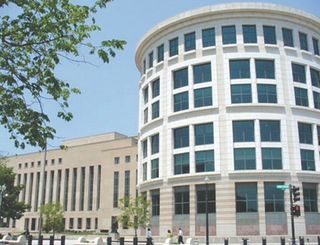Title II Branded ‘Monumental’ Decision

Just check out the recent filings from internet service providers asking a federal appeals court to take another look at the FCC’s Title II decision. One look and it’s pretty clear how important those ISPs think it is to keep challenging the reclassification of internet access as a common carrier service under title II.
Of course, these are the same folks who agreed to the FCC’s compromise bright line net neutrality rules under a non-Title II approach (admittedly as the lesser of two evils), and the ones that have been trying to get back to that original compromise ever since FCC chairman Tom Wheeler and his fellow Democrats opted for the “nuclear” option of Title II.
While that concern is clearly real, driving home the importance of the case in those filings is also a legal calculation meant to be a signal to the Supreme Court if the case eventually winds up there.
Cable and telecom ISPs divided up their arguments this time around, filing at least four separate petitions asking the full U.S. Court of Appeals for the D.C. Circuit to review the three-judge decision last month to uphold the Open Internet order. The decision included bright line rules against blocking, degrading and anti-competitive paid prioritization, as well as a general conduct standard to target other potential threats to the so-called virtuous circle. The bright line rules are also being applied to mobile broadband for the first time, and interconnections are being considered under Title II on a case-by-case basis.
Each petition targets a different issue. CTIA, which represents wireless carriers, is focusing on this first-time application of the regulations to mobile, which it says the FCC can’t do. The National Cable & Telecommunications Association and the American Cable Association are focusing on procedure, arguing that the FCC did not justify its shift from non-Title II-based rules and illegally failed to give notice of “key aspects” of that change. But they share the common theme that this is a huge, potentially historic decision.
In its filing, USTelecom cited the FCC’s Republican commissioners as calling the FCC’s decision—and by extension, the courts upholding of that decision—a “monumental shift” toward government control.
It further said the decision on whether Congress deeded the FCC that power “is a question of exceptional importance to the assignment of power within our government.” The court did not rule on the wisdom of the FCC’s Title II approach, only that it was within its authority to make the decision, and that the decision was not arbitrary and capricious.
Broadcasting & Cable Newsletter
The smarter way to stay on top of broadcasting and cable industry. Sign up below
That is one opinion; meanwhile, NCTA and ACA call it “one of the most consequential telecommunications rulemakings in American history” and say the court panel’s decision to uphold it “eviscerates” procedural protections.
CTIA further called it an issue of “exceptional importance” whose impact on the country will be immense.
It would be unusual to grant en banc rehearing, meaning the entire bench, and not just a panel, would hear the evidence. Billing the decision as “monumental” is an effort to get that court to weigh in, but beyond that, it is a signal to the Supreme Court.
That court generally weighs in to clear up splits when two appeals courts disagree, which is not the case here. But a recent Obamacare decision out of the Supreme Court appeared to buttress the “major questions” doctrine.
Of that decision, King v. Burwell, Adam White, counsel with Boyden Gray, blogged in a Scotusblogpost that, “Courts will need to ask whether the policy matter at hand is of such economic or political significance that it cannot be presumed to have been committed to the agency’s discretion by Congress.” And that result is what ISPs are banking on.
Court’s have generally given significant, so-called “Chevron” deference to federal agencies as the subject area experts per another Supreme Court decision, but ISPs are hoping the Burwell decision signals a new carve-out for important decisions.
Andrew Schwartzman, a veteran Washington attorney who backs the rules, says that is a stretch. “The idea of using this case [Burwell] for such a challenge is ridiculous. The Supreme Court has already said [in the ‘Brand X’ decision—when it narrowly upheld the FCC’s earlier classification of ISPs as information services] that the reclassification issue was properly delegated to the FCC. I doubt that there is any other statute in the last few decades which so clearly delegated so much to the FCC for decision.”
Contributing editor John Eggerton has been an editor and/or writer on media regulation, legislation and policy for over four decades, including covering the FCC, FTC, Congress, the major media trade associations, and the federal courts. In addition to Multichannel News and Broadcasting + Cable, his work has appeared in Radio World, TV Technology, TV Fax, This Week in Consumer Electronics, Variety and the Encyclopedia Britannica.

